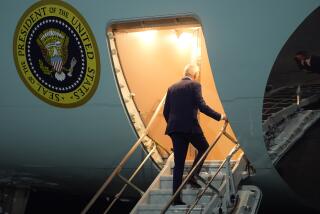Is Panetta qualified?
Three decades ago, a new Democratic president attempted to entrust the CIA to a party insider with limited experience in intelligence matters -- only to see the nomination derailed. If history repeats itself with Barack Obama’s choice of former White House chief of staff Leon E. Panetta to head the spy agency, it could undermine the president-elect’s plan to purge the agency of the excesses of the Bush era.
In 1977, President Carter nominated Theodore Sorensen, who had served as a White House advisor to President Kennedy, to head the CIA. Sorensen withdrew amid opposition ostensibly motivated by the nominee’s past carelessness with classified information. Sorensen’s own explanation was that the Senate and the intelligence community weren’t ready “to accept an outsider who believes as I believe.”
Like Sorensen, Panetta is expected to try to restore a moral compass to the CIA, which periodically loses its way. In today’s context, a return to moral principleswould mean clear prohibitions on inhumane interrogation techniques such as waterboarding and sleep deprivation and an end to the practice of rendition, in which interrogation is subcontracted to foreign nations. Panetta is a proven Washington figure, but he must be confirmed first, and his lack of expertise in intelligence issues could provide a pretext for senators who are comfortable with the status quo.
Obama didn’t help matters by failing to inform Sen. Dianne Feinstein (D-Calif.), the new chairman of the Senate Intelligence Committee, about the impending nomination. On Monday, Feinstein signaled her uneasiness toward her fellow Californian by observing: “I believe the agency is best served by having an intelligence professional in charge at this time.” (On Tuesday, she adopted a more measured tone, saying she looked forward to speaking with Panetta.)
If he is to persuade similarly skeptical senators, Obama needs to articulate why this unconventional choice is the right one. That case could be strengthened by an explanation of how Panetta would work with retired Adm. Dennis C. Blair, Obama’s expected pick for a new position created by Congress in 2004; the director serves as the president’s chief advisor on intelligence matters. Panetta’s nomination makes more sense if he’s to act as a manager while Blair supervises the analysis of intelligence.
Regardless, disputes about Panetta’s qualifications must not jeopardize the overdue reform of the agency he has been chosen to lead.
More to Read
A cure for the common opinion
Get thought-provoking perspectives with our weekly newsletter.
You may occasionally receive promotional content from the Los Angeles Times.






